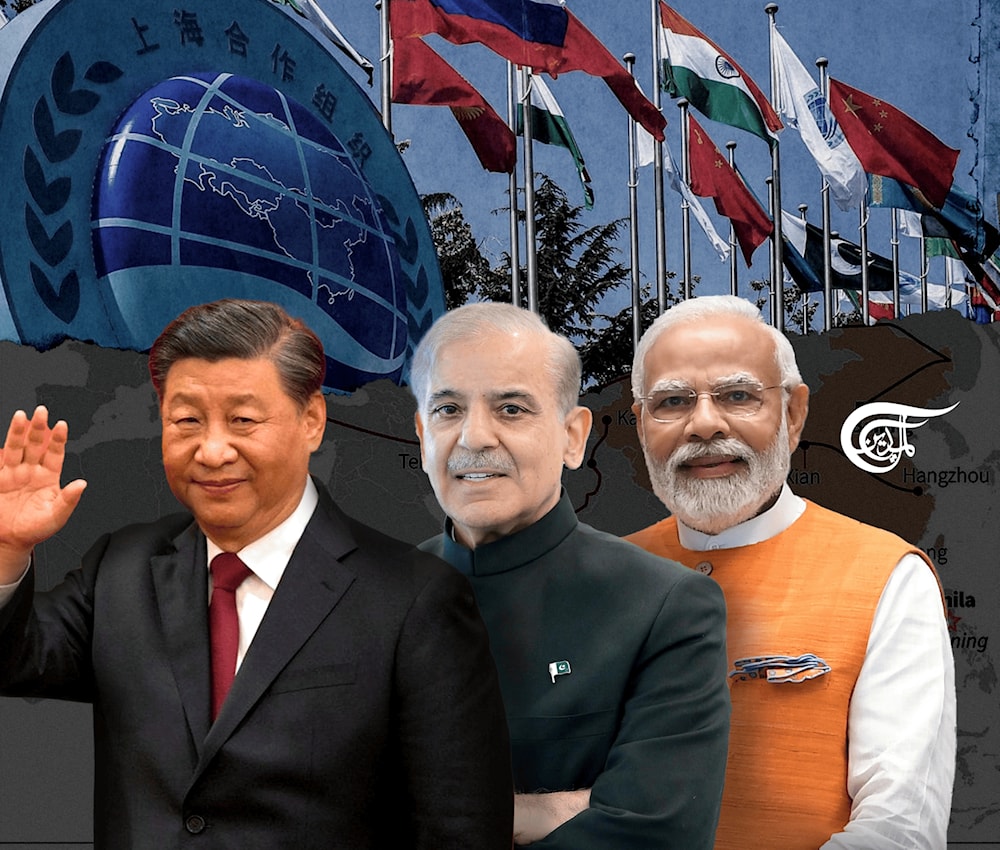The infrastructure investment divide: The West and the SCO
While Washington and the EU have failed to deliver on tangible connectivity gains, SCO shows what genuine cooperation should look like.
-

Indian Foreign Minister Subrahmanyam Jaishankar’s in-person attendance at the summit was a sign that the India-Pakistan trust deficit could wane under SCO. (Al Mayadeen English; Illustrated by Mahdi Rtail)
For years, the United States and its Western allies have missed the mark on lasting infrastructure investments. The European Union’s own transport and energy infrastructure is in a state of decay, and fears of competition with China are pushing policymakers to introspect reform. This is the same cold-war mentality that has made the West an outlier on global connectivity.
Meanwhile, the controversial Group of Seven (G7) “Partnership for Global Infrastructure and Investment (PGII)” is no game changer: multi-country investments in the Democratic Republic of Congo (DRC), Zambia and Angola are filled with lofty promises but little impact. In truth, PGII’s flagship corridor – the Lobito Corridor – is not about empowering Africa. It is a notorious attempt to gain access to Africa’s precious critical minerals.
With the West’s predatory ambitions and incompetence on display, the SCO stands a league apart.
Look no further than the recent Shanghai Cooperation Organization (SCO) Summit in Islamabad, where Pakistani Prime Minister Shehbaz Sharif called for increased regional connectivity investments. Unlike the West, he pointed to the expansion of China’s multibillion-dollar Belt and Road Initiative (BRI). The 10-member Eurasian group also agreed to promote inclusive economic growth in areas spanning investment to logistics.
“The heads of delegations, reaffirming their desire to ensure stable economic and social development in the SCO region, noted the importance of implementing the SCO Economic Development Strategy for the period up to 2030,” read a joint communique at the end of the Summit.
Here’s how the SCO breaks from Western hegemony.
Infrastructure connectivity in action
The grouping features considerable support for China’s flagship BRI, and its transformative demonstration project: the China-Pakistan Economic Corridor (CPEC). Efforts to link BRI with the Russia-led Eurasian Economic Union (EAEU) can change the face of Eurasian connectivity in the long run.
The utility speaks for itself.
For instance, the majority of SCO states depend on China’s BRI to promote multimodal transportation initiatives that link markets and boost transit potential. At the same time, SCO also has a market for a handful of states that are pushing to expand the Russia-led INSTC, an additional infrastructure offering that links India with Russia.
The battle for influence is a healthy one. On the one hand, China remains a top infrastructure financer within the SCO, and brings welcome influence over future port infrastructure and logistics centers in the region. On the other, Russia’s bid to promote its own transport logistics underscores the potential for a robust SCO connectivity framework that integrates both BRI and the INSTC.
Pakistan’s efforts to promote the $62 billion China-Pakistan Economic Corridor as a promising transit trade hub for the SCO is another win for the group. After all, Central Asian states are prioritizing trade and transport connectivity on many fronts, including through the Trans-Caspian Transport Corridor, which has the European Union on edge. These complement the SCO’s broader plans to institutionalize Eurasian connectivity in the long run.
Better diplomacy
Diplomatic tensions are not set in stone.
Indian Foreign Minister Subrahmanyam Jaishankar’s in-person attendance at the summit was a sign that the India-Pakistan trust deficit could wane under SCO. Both neighbors continue to hold intractable positions over the disputed Kashmir territory, and trade remains suspended. And yet, progress on SCO’s infrastructure investments remains smooth.
First, India and Pakistan don’t have a major stake in resisting the SCO’s bid for trade, investment, sustainable development and industrial growth in the Eurasian region. These objectives could materialize if South Asia became more economically integrated. A diplomatic thaw in the long run could enable Pakistan to meet over two-thirds of its untapped trade potential, and improve prospects of a well-integrated $5 trillion South Asian market.
India and Pakistan’s diplomatic tensions are not impeding group consensus on flexible trade. Take intra-SCO trade. There is a widening consensus among nations to reduce their dependence on the US dollar, signaling frustration with Western sanctions. India, China, Russia, and Iran are actively settling trade in local currencies, raising prospects of accelerated de-dollarization in the long run. Progress could help less competitive SCO economies such as Pakistan to decrease transaction costs, foster cross-border business links, and improve the chances of contributing to intra-regional trade. The West cannot dictate the future course of action for these states.
As a result, the SCO’s consistent push for national currency use is a step in the right direction. “The heads of delegations of the interested SCO member states, noting the efforts to seek consensus to develop agreed recommendations for the SCO member states, reaffirmed the need for consistent implementation of the Road Map of the SCO Member States on a gradual increase in the share of national currencies in mutual settlements,” read the joint communique.
Taken together, inclusive economic growth and infrastructure support mark a telling contrast to the West. While Washington and the EU have failed to deliver on tangible connectivity gains, SCO shows what genuine cooperation should look like.
Overwhelming support for China’s Belt and Road (BRI), and possible India-Pakistan rapprochement, make clear that the SCO is less talk and more action.

 Hannan Hussain
Hannan Hussain
 5 Min Read
5 Min Read











